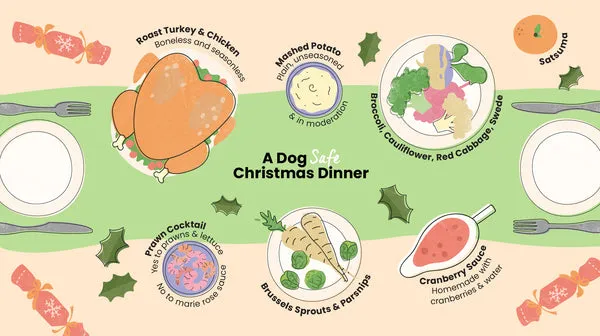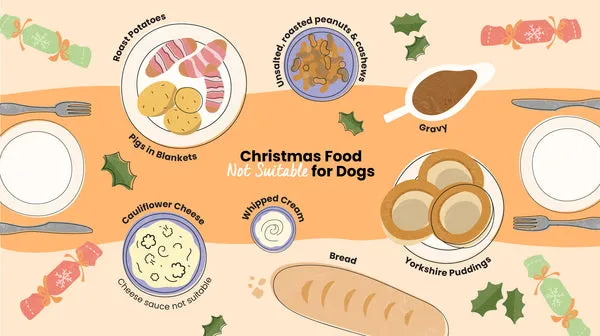Sharing mealtime with your beloved canine companion can be one of life’s simple pleasures. As you settle down for dinner, it’s only natural to wonder if your furry friend can partake in some of the delicious human food on your plate. However, not all human food is created equal when it comes to doggy diets. While some ingredients are perfectly safe and even beneficial, many common dinner items can be harmful or even toxic to dogs. Understanding What Can Dogs Eat For Dinner is crucial for ensuring their health and happiness. This guide will walk you through safe and healthy dinner options, as well as those foods you should absolutely avoid to keep your dog safe and wagging.
Understanding Canine Dietary Needs for Dinner
Dogs are largely omnivores, meaning their diet can include both plant and animal matter. However, their digestive systems and nutritional requirements differ significantly from humans. A dog’s diet should primarily consist of high-quality dog food formulated to provide all essential nutrients. When considering human foods for dinner, it’s vital to remember that dogs generally thrive on plain, unprocessed ingredients. Spices, excessive fats, sugars, and artificial additives common in human meals can cause digestive upset, pancreatitis, or even life-threatening toxicity. Always prioritize their well-being by selecting only canine-safe options prepared appropriately.
Safe & Healthy Dinner Options for Your Canine Companion
With careful preparation, many common human dinner ingredients can be a healthy and delightful addition to your dog’s meal. The key is to serve them plain, unseasoned, and in moderation.
Lean Proteins: The Foundation of a Dog’s Meal
Proteins are essential for your dog’s muscle development and overall health. When preparing proteins for your dog’s dinner, focus on lean, unseasoned options.
- Chicken and Turkey: Both chicken and turkey are excellent sources of lean protein for dogs. Ensure the meat is thoroughly cooked, boneless, and skinless. The skin is high in fat, which can cause digestive issues, and bones pose a significant choking hazard or can splinter and cause internal damage. Serve in bite-sized pieces without any seasonings or marinades. These meats are low in fat (when prepared correctly) and provide a juicy, healthy option. For growing pups, introducing age-appropriate lean proteins is also important.
- Prawns: Yes, dogs can eat prawns, provided they are cooked, completely deshelled, and deveined. They should be served plain, without any added seasoning. Prawns are a good protein source and contain Omega-3 and Omega-6 fatty acids, which contribute to healthy skin, a shiny coat, and good joint health.
Wholesome Vegetables: Packed with Nutrients
Many vegetables offer a wealth of vitamins, minerals, and fiber, making them a great addition to your dog’s dinner plate. Always ensure they are cooked thoroughly (steamed or boiled), unseasoned, and chopped into small, manageable pieces to prevent choking.
- Brussels Sprouts: Many dogs enjoy Brussels sprouts, and they are packed with fiber, vitamins, and minerals. They are low in fat and are even thought to have cancer-fighting properties. However, be warned: they can cause flatulence in some dogs! Always steam or boil them and chop them up, with no added salt, oil, or butter.
- Parsnips and Swede: Both parsnips and swede are safe for dogs, offering B vitamins, vitamins C and K, and potassium. They are digestible and a good source of dietary fiber. If cooking, boil them plain without any honey glaze, oil, butter, or salt, then serve chopped or mashed.
- Broccoli and Cauliflower: In moderation, plain, steamed or boiled broccoli and cauliflower are fantastic for dogs. They are super healthy, rich in vitamins C, K, and some B vitamins, and high in fiber. They also contain antioxidants. Remember to chop florets into bite-sized chunks to avoid choking hazards. Like sprouts, they can cause gas.
- Red Cabbage: Red cabbage can add a boost of vitamins and antioxidants to your dog’s meal. Make sure it’s boiled or steamed until soft, not fried, and without any salt or seasoning. Chop it into small pieces as some parts can be tough to chew. Feed in moderation due to its high fiber content.
Smart Carb Choices: Energy and Digestion
While complex carbohydrates are a good energy source, moderation and preparation are key for dogs.
- Potatoes (Plain): Dogs can eat plain, cooked potatoes, but they should be boiled or mashed without any salt, butter, or other seasonings. Roast potatoes are generally too fatty and starchy for a dog’s digestive system. Serve a small amount as an occasional treat, ensuring the main portion of their meal consists of lean meat and vegetables. For more insight into healthy human foods, consider what human foods are healthy for dogs.
Fruits as Occasional Treats
Some fruits can be a healthy, vitamin-rich treat, but always remove seeds and skin, and offer them in moderation.
- Satsumas/Oranges: These juicy citrus fruits can offer a boost of vitamin C for dogs. Be sure to remove all seeds, skin, and tough pithy pieces. Introduce them slowly, as some dogs might have allergies or respond negatively.
 An illustrated Christmas dinner table showing dog-safe foods: unseasoned boneless chicken and turkey, deshelled prawns, plain mashed potatoes, various boiled vegetables, plain cranberry sauce, red cabbage, and satsuma.
An illustrated Christmas dinner table showing dog-safe foods: unseasoned boneless chicken and turkey, deshelled prawns, plain mashed potatoes, various boiled vegetables, plain cranberry sauce, red cabbage, and satsuma.
What to Absolutely AVOID: Toxic & Harmful Foods for Dogs
While it’s tempting to share everything, many human dinner foods are completely unsuitable or even deadly for dogs. Here’s a comprehensive list of what to keep off their dinner plate.
Processed Meats & High-Fat Dishes
Foods high in fat and salt can lead to serious health issues, including pancreatitis, obesity, and stomach upset.
- Pigs in Blankets: These are too high in fat and salt for a dog’s delicate digestive system.
- Roast Potatoes: Unlike plain boiled potatoes, roast potatoes are cooked in oil and are often salted, making them too fatty and starchy.
- Yorkshire Puddings: Made with flour, eggs, and milk and cooked in oil, they offer no nutritional value and are very rich, likely causing bloating or an upset stomach.
- Gravy: Most human gravy is extremely high in fat and salt. It can also contain onions and garlic, which are toxic to dogs.
- Pâté: This indulgent treat is high in fat, salt, and seasoning, posing a risk for pancreatitis and general digestive upset.
- Crisps: These are a big no-no due to their high fat content, excessive salt, and often toxic seasonings.
- Whipped Cream: Too rich for most doggy digestive systems, it can cause discomfort and stomach upset.
The Silent Dangers: Onions, Garlic, and Alliums
Onions, garlic, leeks, and chives (all members of the allium family) are highly toxic to dogs and can cause red blood cell damage, leading to anemia.
- Stuffing: This often contains high amounts of fat, as well as garlic and onions, which can wreak havoc on a dog’s stomach and lead to anemia.
- Soup: Human soups often contain ingredients like cream, high salt, chili, onions, garlic, and other seasonings that are unsuitable or toxic for dogs.
Sweet Treats & Desserts: A Big No-No
Dogs do not need sugar, and many sweet human treats contain ingredients that are extremely poisonous.
- Chocolate: One of the most well-known toxins for dogs due to its theobromine content. Even small amounts can cause serious illness. Keep all chocolate, including logs and wrapped presents, well out of reach.
- Christmas Pudding/Cake and Mince Pies: These commonly contain raisins, sultanas, and other dried fruits (grapes are toxic to dogs, potentially causing renal failure), as well as alcohol and strong flavorings which are poisonous.
- Gingerbread: High in sugar and fats. Many gingerbread recipes also include nutmeg, which is toxic to dogs and can cause seizures and hallucinations.
- Sweets: Full of sugar leading to weight gain. More dangerously, many “sugar-free” sweets contain Xylitol, an artificial sweetener that is lethal to dogs, causing symptoms like vomiting, lethargy, seizures, and liver disease.
Nuts & Other Miscellaneous Hazards
Some other items found at dinner can also pose serious risks.
- Macadamia Nuts: These are poisonous to dogs and should never be given under any circumstances.
- Blue Cheese: While some dogs love mild cheese, blue cheese contains molds that can be harmful to dogs, in addition to being high in fat and salt.
- Mustard: Its potent flavor and ingredients offer no nutritional value and can cause digestive upset.
- Bread: While plain bread is generally safe in small amounts, it has little nutritional value and can often contain toxic ingredients like raisins or certain seasonings, especially during festive periods. Avoid it as a regular item.
- Prawn Cocktail Sauce: This tangy sauce is high in fat, salt, and sugar, which can cause stomach upset.
- Commercial Cranberry Sauce: Always check labels. If it contains grapes or raisins, avoid it. Be cautious of “sugar-free” versions that might contain Xylitol.
 An infographic illustrating festive foods unsuitable for dogs: roast potatoes, unsalted roasted peanuts and cashews, gravy, Yorkshire puddings, pigs in blankets, cauliflower cheese, bread, and whipped cream.
An infographic illustrating festive foods unsuitable for dogs: roast potatoes, unsalted roasted peanuts and cashews, gravy, Yorkshire puddings, pigs in blankets, cauliflower cheese, bread, and whipped cream.
General Guidelines for Safe Dog Dinners
When deciding what can dogs eat for dinner, following these general guidelines will help ensure their safety and health:
- Always Serve Plain and Unseasoned: The golden rule for feeding human food to dogs is to keep it free of salt, sugar, spices, oils, butter, and any other seasonings.
- Remove Bones, Skin, and Excess Fat: Always debone meat, remove skin, and trim off any excess fat before offering it to your dog.
- Chop Food into Bite-Sized Pieces: This prevents choking hazards and aids digestion, especially for smaller dogs or those who tend to gulp their food.
- Introduce New Foods Slowly: When introducing a new food, start with a very small amount to see how your dog reacts. Watch for any signs of digestive upset like vomiting or diarrhea.
- Portion Control is Crucial: Even safe human foods should only be given in moderation as a small part of their overall balanced diet, not as a main meal replacement. Overfeeding can lead to weight gain and digestive problems.
- Consult Your Veterinarian: If you have any doubts about a particular food or if your dog has specific dietary needs or health conditions, always consult your veterinarian for personalized advice. While exploring options, remember that certain meats, like cooked poultry, are generally safe, but always be cautious about what is the one meat all dogs should avoid. Additionally, if you’re considering offering bones, understand what types of bones can dogs eat safely.
Conclusion
Sharing your dinner table with your dog can be a wonderful bonding experience, provided you make informed and safe choices. While it’s tempting to let them try a bit of everything, knowing what can dogs eat for dinner and, more importantly, what they absolutely cannot, is vital for their health. By sticking to plain, cooked, lean proteins and appropriate vegetables and fruits, while rigorously avoiding toxic and high-fat items, you can ensure your canine companion enjoys a safe and healthy mealtime alongside you. Always prioritize their well-being and when in doubt, consult your vet. For more expert advice on canine nutrition and care, visit Dog Care Story.
